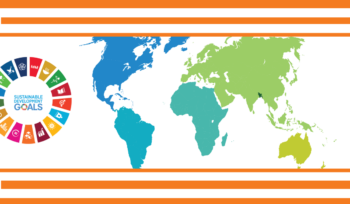Association of Southeast Asian Nations (ASEAN): the history of the bloc and its members. Should Bangladesh become a member?

What is ASEAN?
The Association of Southeast Asian Nations (ASEAN) was established in 1967 in Bangkok with the signing of the ASEAN Declaration – also known as the Bangkok Declaration. Initially, this declaration was signed by five countries (Indonesia, Malaysia, Philippines, Singapore and Thailand) however five more members jointed the bloc subsequently.
The next country to be joined was Brunei Darussalam in 1984 whereas Vietnam and Myanmar joined in 1995 and 1997 respectively. Lao PDR and, and Cambodia jointed on 1999, making up the ten Member States of ASEAN.
Aims and purposes?
Based on the ASEAN declaration, the organization has the following aims and purposes:
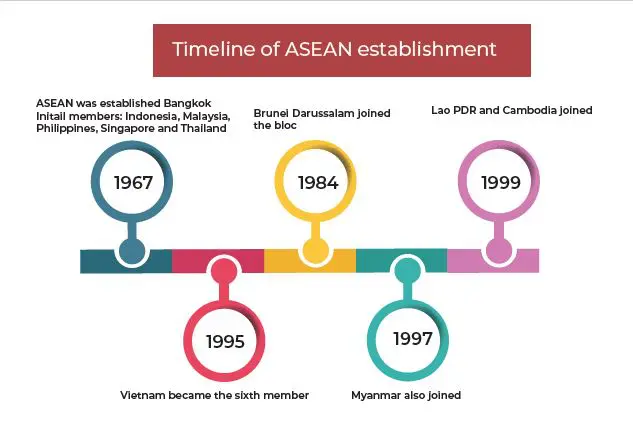
- To accelerate the economic growth, social progress and cultural development in the region through joint endeavours in the spirit of equality and partnership in order to strengthen the foundation for a prosperous and peaceful community of Southeast Asian Nations;
- To promote regional peace and stability through abiding respect for justice and the rule of law in the relationship among countries of the region and adherence to the principles of the United Nations Charter;
- To promote active collaboration and mutual assistance on matters of common interest in the economic, social, cultural, technical, scientific and administrative fields;
- To provide assistance to each other in the form of training and research facilities in the educational, professional, technical and administrative spheres;
- To collaborate more effectively for the greater utilization of their agriculture and industries, the expansion of their trade, including the study of the problems of international commodity trade, the improvement of their transportation and communications facilities and the raising of the living standards of their peoples;
- To promote Southeast Asian studies; and
- To maintain close and beneficial cooperation with existing international and regional organizations with similar aims and purposes, and explore all avenues for even closer cooperation among themselves (Source: ASEAN website).
Aims and purposes?
Over the years ASEAN has made significant progress concerning the economic integration and free trade in the region. To further the economic cooperation among members, the members created the ASEAN Free Trade Area with the following goals:
- Creating a single market
- Increasing intra-ASEAN trade and investment
- Attracting foreign investment
Intra-ASEAN trade among member states has increased from 19% in 1993 to 23% in 2017. Currently, more than 90% of the goods are traded with no tariffs within the bloc. A range of key sectors including electronics, automotive, rubber-based products, textiles and apparels, agro-based products, and tourism are prioritized under the pact.
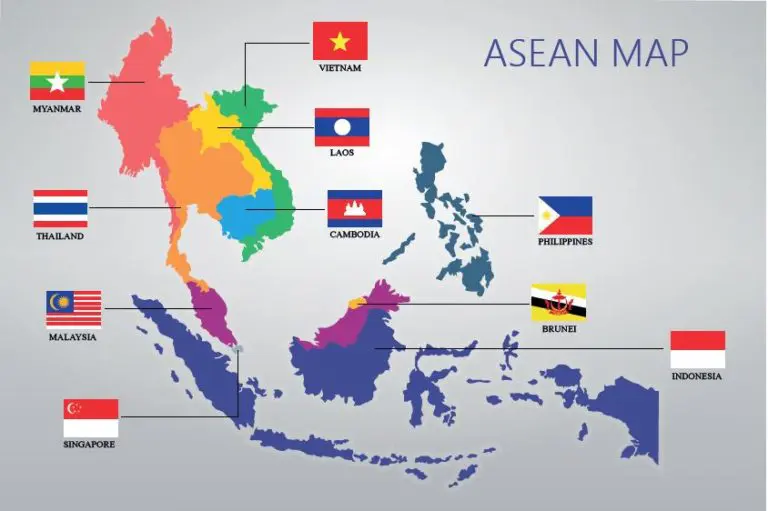
Eligibility of new members
The foremost criterion of becoming an ASEAN member is that any prospective member must be geographically located in Southeast Asia. According to the 1967 ASEAN Declaration, all states in the South-East Asian region that subscribe to the aims and objective of ASEAN are eligible to become a member.
Geographical location was the main consideration for the consistent refusals of the membership request from Papua New Guinea and Sri Lanka.
The ASEAN Charter – entered into force since 2008 – described the following broad criteria for membership (in Article 6):
1. The procedure for application and admission to ASEAN shall be prescribed by the ASEAN Coordinating Council
2. Admission shall be based on the following criteria:
- location in the recognised geographical region of Southeast Asia;
- recognition by all ASEAN member states;
- agreement to be bound by the ASEAN Charter; and
- ability and willingness to carry out the obligations of membership
3. Admission shall be decided by consensus by the ASEAN Summit upon the recommendation of the ASEAN Coordinating Council.
4. An applicant State shall be admitted to ASEAN upon signing an Instrument to the Charter.
Member Obligations
Member states have both legal and practical obligations with a significant financial commitment.
- Attending ASEAN ministerial meetings (and Summits) as a Guest of ASEAN, and participating as Observer at ASEAN meetings;
- Acceding to (and thus undertaking to implement) all the treaties and agreements of ASEAN;
- Preparing or improving capacities to meet the requirements of the ASEAN Free Trade Area as well as ASEAN’s collective free trade agreements with Dialogue Partners;
- Establishing and maintaining embassies in all current ASEAN members (to be reciprocated);
- Contribution of US$1 million to the ASEAN Development Fund, as a onetime “membership fee”;
- Commitment to attend all scheduled ASEAN meetings, fulfil the rotational hosting and chairing duties of ASEAN meetings, and participate in regional projects under the different sectors of cooperation; and
- Commitment to contribute an equal share to the annual operating budget of the ASEAN Secretariat.
Relations with non-members
ASEAN maintains various forms of partnership with non-members mainly on the account of mutually beneficial dialogue and cooperation with countries and sub-regional, regional, international organisations and institutions.
For non-members, there are different ways to be engaged with the bloc and ASEAN foreign ministers have the right to grant an external party the formal status of Dialogue Partner, Sectoral Dialogue Partner, Development Partner, Special Observer, Guest, or another status.
Dialogue Partners
Dialogue partners are mostly developed economies and have established cooperation funds under each dialogue to support joint projects. The Dialogue Partners also commit additional funding and technical support for specific initiatives. Informal dialogues started in 1972 between ASEAN members and the European Economic Community (EEC), and Japan, but Australia became ASEAN’s first formal Dialogue Partner in 1974.
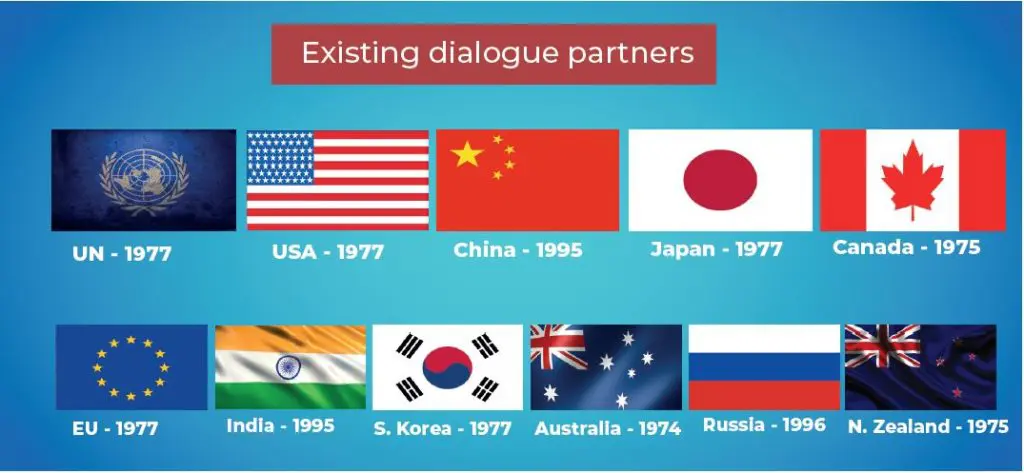
Informal dialogues started in 1972 between ASEAN members and the European Economic Community (EEC), and Japan, but Australia became ASEAN’s first formal Dialogue Partner in 1974.
Development Partners
ASEAN’s Dialogue Partners are also considered its development partners because they have assisted ASEAN’s development trajectory. Regional organisations working with ASEAN on various aspects of economic and infrastructure development are given similar consideration. To date, only one country – Germany – has been accorded a separate Development Partner status.

Sectoral Partners
Sectoral partnerships are different from dialogue relations. The scope of interaction with ASEAN is limited to certain sectors where the partner’s contributions can support ASEAN’s community-building priorities. Norway’s sectoral partnership with ASEAN was the culmination of several years of prior engagement while Switzerland’s sectoral partnership focuses on niche areas of capacity-building.
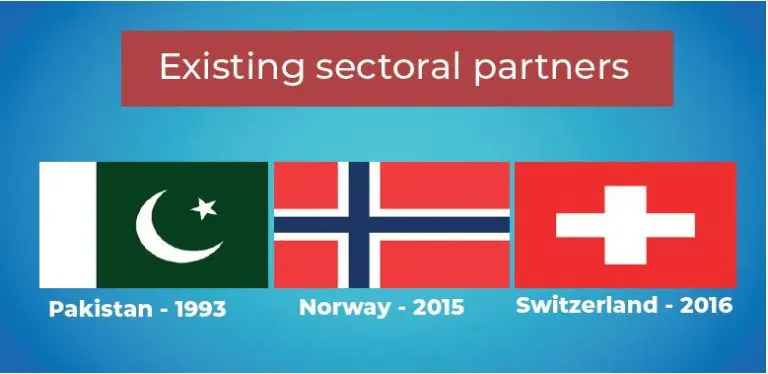
Sectoral Partners
Observer status is granted only to potential members of ASEAN who satisfy the criteria set for ASEAN membership. Observers are not part of ASEAN’s dialogue or development cooperation. Observer status does not grant automatic admission into ASEAN. Neither does membership application guarantee automatic observer status. Timor-Leste, which put in its membership bid in 2011, is not an observer to date, and can only attend open sessions of ASEAN Summits and ministerial meetings as a Guest.
Currently, only Papua New Guinea is an observer to ASEAN meetings. It has held Special Observer status since 1976, but only attends opening ceremonies of ASEAN Summits and holds occasional consultations with ASEAN counterparts.
Guests
Guests of ASEAN are invited to the opening ceremonies and welcome dinners of ASEAN Summits and ministerial meetings. These invitations are not institutionalized and the “guest” status is given at the prerogative of the ASEAN Chair only for a particular meeting. The Democratic People’s Republic of Korea falls in this category.
Status of Turkey’s and Mongolia’s membership application
Both Turkey and Mongolia have acceded to the TAC (Treaty of Amity and Cooperation in Southeast Asia) but they clearly cannot be considered for ASEAN membership, with the geographical criterion being the most significant impediment.
Mongolia’s track record in the ARF (ASEAN Regional Forum) may be a factor in considering closer ties, but much more deliberation is necessary for determining the substance of relations, even as a sectoral partner. Turkey may consider seeking ARF participation, but its geographical location is ambiguous and will require clarifying whether it identifies with East or West.
Beyond diplomatic considerations, Turkey and Mongolia have not made a case for a closer political, economic and strategic relationship with ASEAN.
Should Bangladesh consider joining the ASEAN?
Bangladesh is described as a South Asian country but it has a border with Myanmar which may give some advantage should the country decide to join ASEAN due to the geographic location. However, the economic benefits of joining the bloc must be properly assessed before making any membership application.
When Bangladesh graduates from LDC (Least Developed Countries) in 2024, within 03 years it will lose duty-free (DF), most favourite nation (MFN), the generalized system of preferences (GSP), and all other LDC facilities, So different trade agreements along with joining the bloc would be essential to offset the impact of LDC graduation.
Joining the ASEAN might not be the best strategic option as more than 90% of the goods are traded with no tariffs within the member states. Except for a few countries, Bangladesh imports more from ASEAN member states than they export meaning it would lose tariff. To maximise the benefits, many of the ASEAN members will export huge quantity threatening local manufacturing.
A proper feasibility study should be carried out to understand the long-term benefits and based on the results of the study, Bangladesh may consider becoming an observer and after a period of observation, it could decide whether to join ASEAN or not.
Author: Sujon Ahamed is a senior business consultant at NewVision Solutions Ltd. For further communication: sahamed@newvision.rosetech.dev


